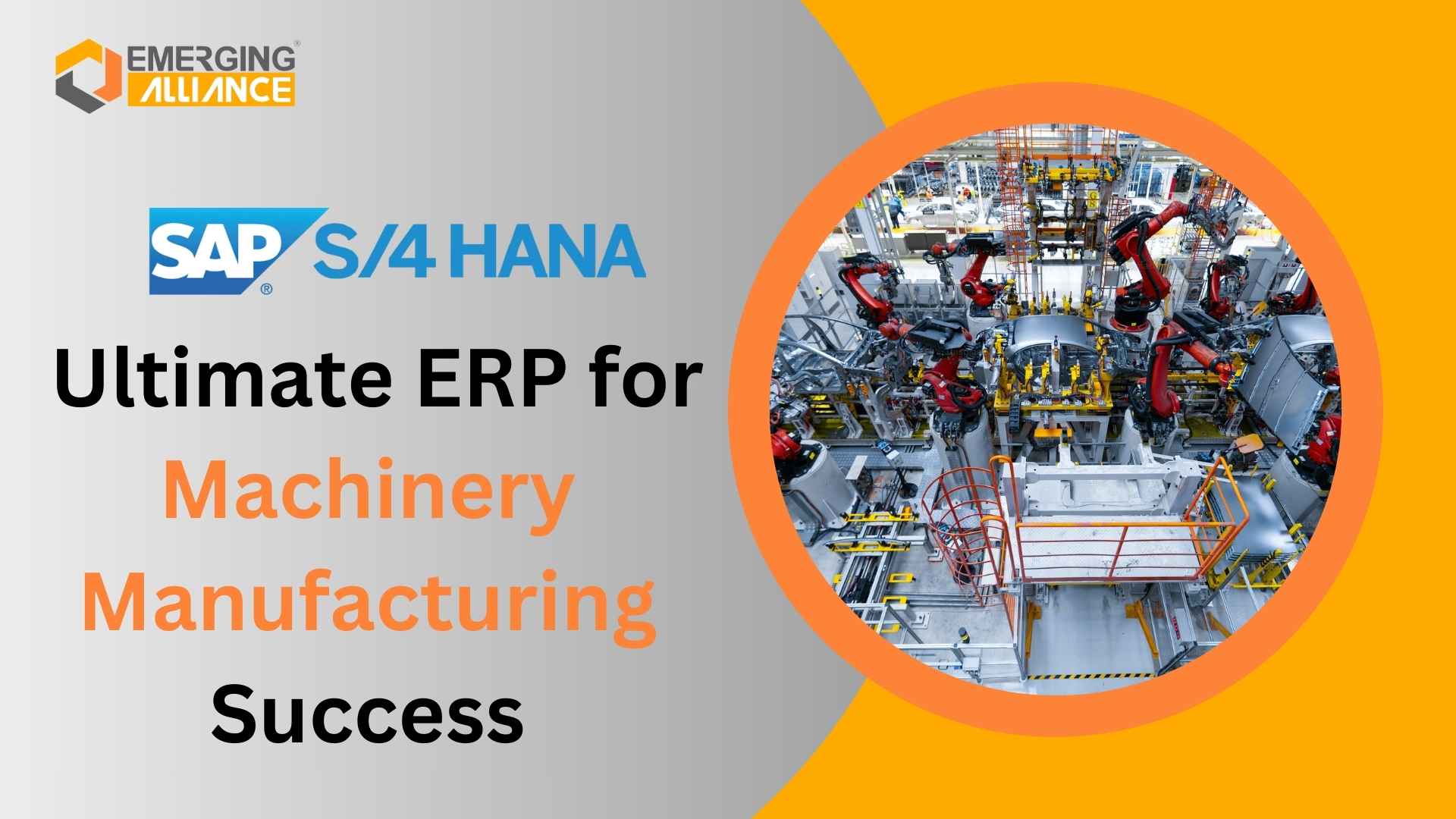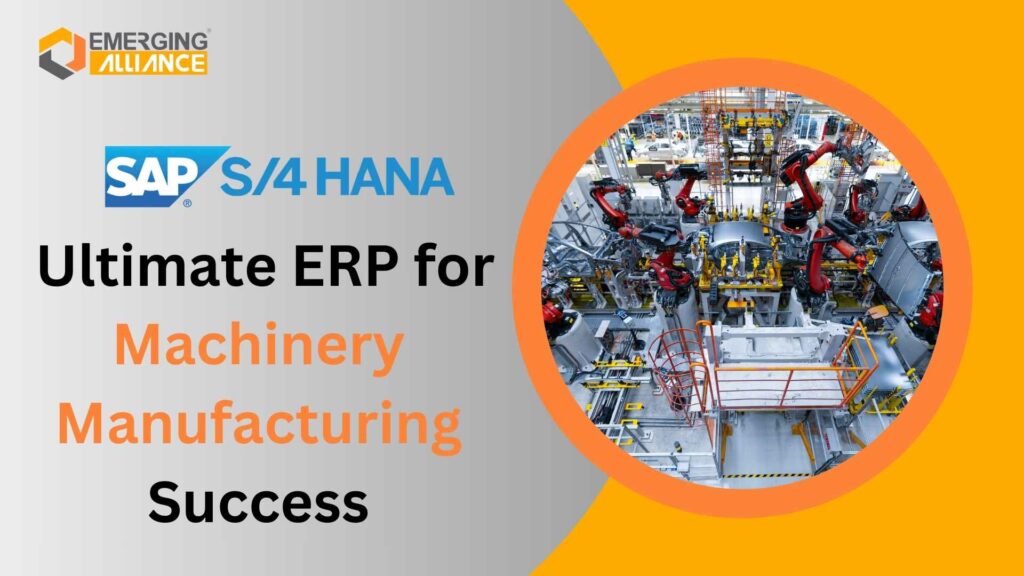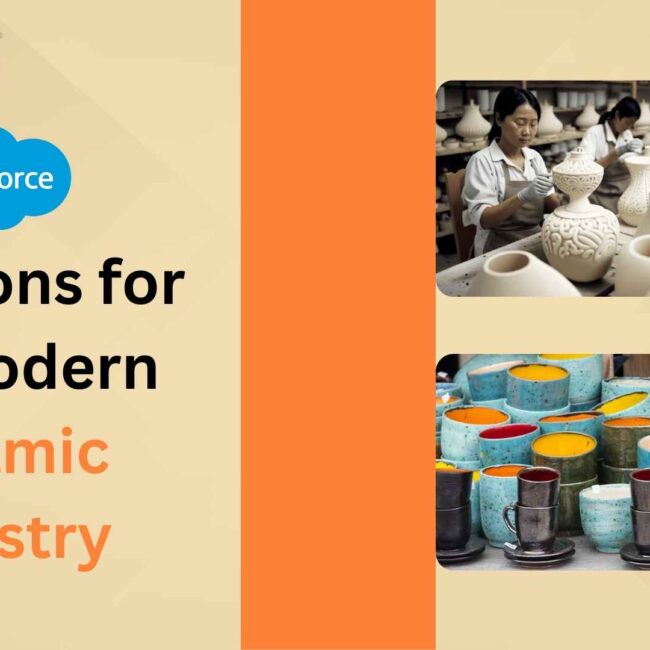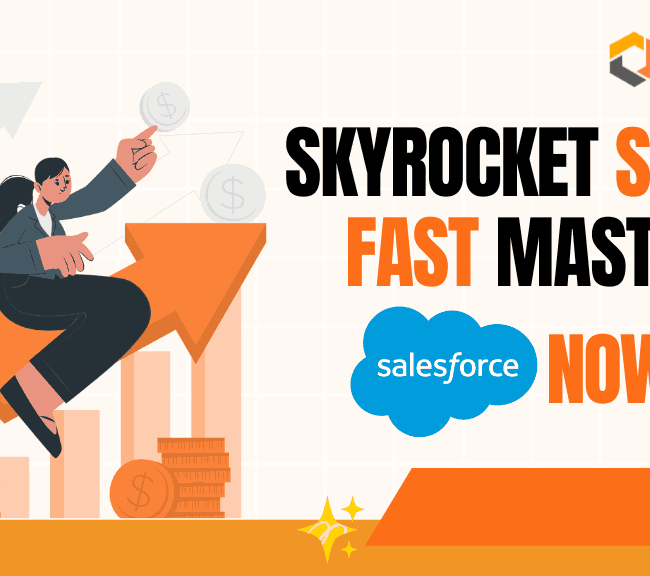
SAP S/4 HANA: Ultimate ERP for Machinery Manufacturing Success

SAP S/4 HANA: The ERP Solution Powering Machinery Manufacturing Growth
The machinery manufacturing industry is evolving rapidly, driven by technological advancements, market demands, and increasing competition. Manufacturers need robust and efficient enterprise resource planning (ERP) solutions to streamline operations, enhance production efficiency, and improve decision-making. SAP S/4 HANA emerges as the ultimate ERP solution designed to meet the specific challenges of machinery manufacturing.
SAP S/4 HANA provides manufacturers with real-time data, intelligent automation, and integration capabilities that drive digital transformation. Whether it’s optimizing supply chain management, reducing downtime, or improving asset utilization, SAP S/4 HANA ensures that machinery manufacturers remain competitive in an increasingly digital world.
Key Challenges in Machinery Manufacturing
Before diving into how SAP S/4 HANA benefits machinery manufacturing, let’s look at the key challenges manufacturers face:
- Complex Supply Chains: Managing global suppliers, logistics, and inventory requires precise coordination.
- Production Downtime: Unplanned downtime results in significant revenue loss.
- Asset and Maintenance Management: Machinery assets need continuous monitoring to avoid unexpected failures.
- Regulatory Compliance: Manufacturers must adhere to strict industry regulations.
- Customer Expectations: Increasing demand for customization and rapid delivery challenges traditional manufacturing models.
- Data Silos: Disconnected data leads to inefficiencies and delays in decision-making.
How SAP S/4 HANA Transforms Machinery Manufacturing
Real-time Analytics for Better Decision-Making: SAP S/4 HANA provides real-time insights into production data, supply chains, and financials. Manufacturers can monitor KPIs such as production efficiency, equipment utilization, and cost control through AI-driven analytics.
Intelligent Automation to Reduce Errors: With AI and machine learning, SAP S/4 HANA automates repetitive tasks such as procurement, inventory updates, and production planning. This minimizes human errors and enhances operational efficiency.
Predictive Maintenance for Machinery Uptime: Unplanned downtime in machinery manufacturing can lead to substantial losses. SAP S/4 HANA uses IoT-powered predictive maintenance to detect early signs of equipment failure, allowing manufacturers to schedule maintenance proactively.
Optimized Supply Chain and Logistics: SAP S/4 HANA ensures end-to-end supply chain visibility, enabling manufacturers to track material flow, manage logistics efficiently, and reduce costs. The system integrates demand forecasting, supplier collaboration, and warehouse management for seamless supply chain operations.
Enhanced Production Planning and Execution: The ERP optimizes production schedules based on demand patterns, available resources, and supply constraints. This ensures that production remains flexible and responsive to market fluctuations.
Compliance and Risk Management: Machinery manufacturers must adhere to global regulatory standards. SAP S/4 HANA provides automated compliance tracking, real-time reporting, and risk mitigation tools to ensure manufacturers meet legal requirements effortlessly.
Customer-Centric Approach: With integrated CRM capabilities, SAP S/4 HANA allows machinery manufacturers to offer customized products, accurate pricing, and on-time delivery to enhance customer satisfaction and loyalty.
SAP S/4 HANA Key Modules for Machinery Manufacturing
SAP S/4 HANA comes with specialized modules tailored for machinery manufacturers:
- Production Planning (PP): Optimizes scheduling and production processes.
- Supply Chain Management (SCM): Ensures seamless supplier collaboration and inventory management.
- Asset Management (EAM): Provides real-time monitoring of machinery and predictive maintenance.
- Finance (FI) and Controlling (CO): Automates financial processes and improves cost control.
- Quality Management (QM): Enhances product quality and regulatory compliance.
- Sales & Distribution (SD): Streamlines order management and customer service.
Implementation Steps for SAP S/4 HANA in Machinery Manufacturing
1: Business Assessment & Strategy Planning
- Identify current challenges and define business objectives.
- Map existing workflows to SAP S/4 HANA capabilities.
2: System Configuration & Data Migration
- Customize SAP S/4 HANA modules to fit specific business needs.
- Migrate legacy data and ensure seamless integration.
3: User Training & Change Management
- Conduct training sessions for employees.
- Establish a support framework for smooth adoption.
4: Go-Live & Continuous Optimization
- Implement phased deployment for minimal disruption.
- Monitor system performance and optimize processes over time.
Transforming Machinery Manufacturing
SAP S/4 HANA is the ultimate ERP solution for machinery manufacturing businesses looking to improve operational efficiency, reduce costs, and drive innovation. Its real-time analytics, intelligent automation, and predictive maintenance capabilities make it a game-changer in the industry.
If you’re ready to transform your machinery manufacturing operations, explore SAP S/4 HANA today and stay ahead in the competitive landscape.
Frequently Asked Questions (FAQs)
1. What makes SAP S/4 HANA different from traditional ERP systems?
SAP S/4 HANA runs on an in-memory database, allowing real-time data processing, faster analytics, and intelligent automation.
2. How does SAP S/4 HANA support Industry?
SAP S/4 HANA integrates with IoT, AI, and machine learning, enabling smart manufacturing, automation, and data-driven decision-making.
3. Is SAP S/4 HANA suitable for small and medium-sized machinery manufacturers?
Yes, SAP S/4 HANA offers scalable solutions that can be customized for businesses of all sizes.
4. What is the deployment option for SAP S/4 HANA?
SAP S/4 HANA can be deployed on-premise, in the cloud, or as a hybrid model, based on business needs.
5. How does SAP S/4 HANA enhance predictive maintenance?
It leverages IoT sensors and AI algorithms to detect machinery issues before failures occur.
6. Can SAP S/4 HANA integrate with other manufacturing software?
Yes, SAP S/4 HANA supports seamless integration with third-party applications and legacy systems.
7. How long does it take to implement SAP S/4 HANA in a machinery manufacturing company?
Implementation timelines vary but typically range from 6 to 18 months, depending on company size and customization requirements.
8. How does SAP S/4 HANA improve supply chain management?
It provides real-time supply chain visibility, enabling better demand forecasting, procurement, and inventory control.
9. What are the security features of SAP S/4 HANA?
SAP S/4 HANA includes data encryption, role-based access control, and compliance monitoring to ensure data security.
10. What is the ROI of implementing SAP S/4 HANA?
Most businesses experience a return on investment (ROI) within 2-3 years due to cost savings, improved efficiency, and revenue growth.
Ready to transform your Machinery Manufacturing business with SAP S/4 HANA? Contact us at https://emerging-alliance.net/ today for a free consultation!






